

When Fort Sumpter was fired on I was a school boy twelve years of age and a resident of the quiet and at that time, unprogressive old town of Lynchburg, Virginia. My Father was a Union sympathizer, but had little or no influence over my political opinions. These were molded entirely by my school companions who, it is needless to say, were all loyal southerners and many of them gave up their lives in defense of their principles.
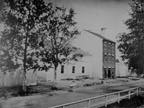
Slavery existed, but it was mild in comparison with the states farther south. There were no such Barbarities as is depicted in “Uncle Tom’s Cabin”. Now and then there would be cases of apparent cruelty, but in the great majority of cases the slaves lived very happily with their masters. At the inter- section of Bridge and Main Streets stood the old Market House, the lower part a market, the upper part a jail. On the Main Street front there was a large block, very much like butchers used for chopping meat. On this block it was the custom to place slaves who were to be auctioned. I have seen men, women and children sold here to the highest bidder.
These sales made no impression on me at the time. I remember one case of cruelty that came under my observation which I no doubt would have long since forgotten but for a remark made by my Father, which proved prophetic, and was fulfilled in less than one year.
It was about a year before the war when Father and I were walking across a long narrow bridge that spanned a deep ravine on Church Street [This bridge I learn has long since been torn down and the ravine filled in] when we heard loud cries coming from a house at the end of the bridge nearest to Clay Street. When we approached we saw a white man flogging a Negro woman. Whether she deserved it or not, I do not know and did not care at that time and would as I said have forgotten the incident, but for the words my Father uttered. In his indignation, he turned and addressing no one in particular, although there were several present, said “Some day this will be wiped out in Blood”.
The Virginians were hot blooded and quick to resent insult or injury. I remember on one occasion seeing a crowd gathered nearly opposite the office of “The Daily Virginian”, and hurrying up I found a man lying on the pavement shot through his neck, and dying. The man who shot him gave himself up and proved to the satisfaction of the jury that the man killed had wrecked his home, and the verdict was “justifiable homicide”. A very short time before that there had been a battle between employees of two newspapers, over remarks made erogatory to some of the editors. This occurred on the orner of Clay and Church Streets, and I believe resulted in one death. I simply mention these to show the temper of the southern people at the time of which I am writing.
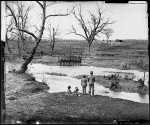 But, to return to my subject, when news came that Sumpter was fired upon the town fairly seethed
with excitement. Men stood on the street corners in groups discussing the news. Companies were
formed and when the news came on the seventeenth of April, sixty-one, that Virginia had seceded, it
met everywhere with approval and was cheered to the echo. The southern youth rushed to arms. No
compulsion at that time was needed. The town was soon stripped of all its young men. Then Bull Run
added fuel to the flames, and older men enlisted and there remained only the old men, women and boys.
But, to return to my subject, when news came that Sumpter was fired upon the town fairly seethed
with excitement. Men stood on the street corners in groups discussing the news. Companies were
formed and when the news came on the seventeenth of April, sixty-one, that Virginia had seceded, it
met everywhere with approval and was cheered to the echo. The southern youth rushed to arms. No
compulsion at that time was needed. The town was soon stripped of all its young men. Then Bull Run
added fuel to the flames, and older men enlisted and there remained only the old men, women and boys.
 About this time the South suffered a great shock in the death of Stonewall Jackson. He was the idol of the South. They all loved him and had the utmost confidence in his abilities. His loss was irreparable. I remember standing on the hill overlooking the railroad as the funeral train pulled slowly in. The booming of the minute guns and the sobbing of bystanders made a deep impression on me. I followed the funeral procession through the town with many of my school fellows, and although we were boisterous and mischief-loving boys, yet that funeral march was as quiet and as orderly
as any that I have ever seen. After this, things became rapidly worse, and Father communicated with friends in Richmond and found that passports could be bought by those who were too old or too young for active service.
About this time the South suffered a great shock in the death of Stonewall Jackson. He was the idol of the South. They all loved him and had the utmost confidence in his abilities. His loss was irreparable. I remember standing on the hill overlooking the railroad as the funeral train pulled slowly in. The booming of the minute guns and the sobbing of bystanders made a deep impression on me. I followed the funeral procession through the town with many of my school fellows, and although we were boisterous and mischief-loving boys, yet that funeral march was as quiet and as orderly
as any that I have ever seen. After this, things became rapidly worse, and Father communicated with friends in Richmond and found that passports could be bought by those who were too old or too young for active service.

 Father found that passports could not be paid for in Confederate money, but must be paid for in greenbacks or gold. He had to do some hustling around Richmond and among the prisoners to get the amount necessary. Twenty-five for one was what was asked and given. This was done on the quiet as the authorities did not look with favor on this kind of trading. I went with him and it required several days to get what was necessary for
our purposes. Those who were fortunate enough to possess either gold or greenbacks were loath to part with them, but by the influence of friends and the willingness on his part to pay whatever was asked, he finally got together enough to see him through.
Father found that passports could not be paid for in Confederate money, but must be paid for in greenbacks or gold. He had to do some hustling around Richmond and among the prisoners to get the amount necessary. Twenty-five for one was what was asked and given. This was done on the quiet as the authorities did not look with favor on this kind of trading. I went with him and it required several days to get what was necessary for
our purposes. Those who were fortunate enough to possess either gold or greenbacks were loath to part with them, but by the influence of friends and the willingness on his part to pay whatever was asked, he finally got together enough to see him through.
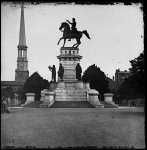
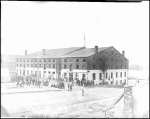
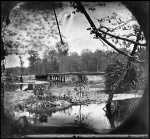 The first day we passed over the Chickahominy Creek and over the battlefields where McClellan met with disaster. I remember seeing the bones of horses piled up in heaps and the trees riddled by grape shot and musket balls. When tired riding, the younger members of the party would get out and walk. I remember crossing the Pamunkey River
on a rope ferry raft. The river was not very wide at this point. In fact, hardly worth mentioning had it not caused us some trouble with the horses and also I might say, some amusement. Safely over this we kept on the same direction to the Rappanhonock which we reached about seven o’clock on the evening of the second day.
The first day we passed over the Chickahominy Creek and over the battlefields where McClellan met with disaster. I remember seeing the bones of horses piled up in heaps and the trees riddled by grape shot and musket balls. When tired riding, the younger members of the party would get out and walk. I remember crossing the Pamunkey River
on a rope ferry raft. The river was not very wide at this point. In fact, hardly worth mentioning had it not caused us some trouble with the horses and also I might say, some amusement. Safely over this we kept on the same direction to the Rappanhonock which we reached about seven o’clock on the evening of the second day.